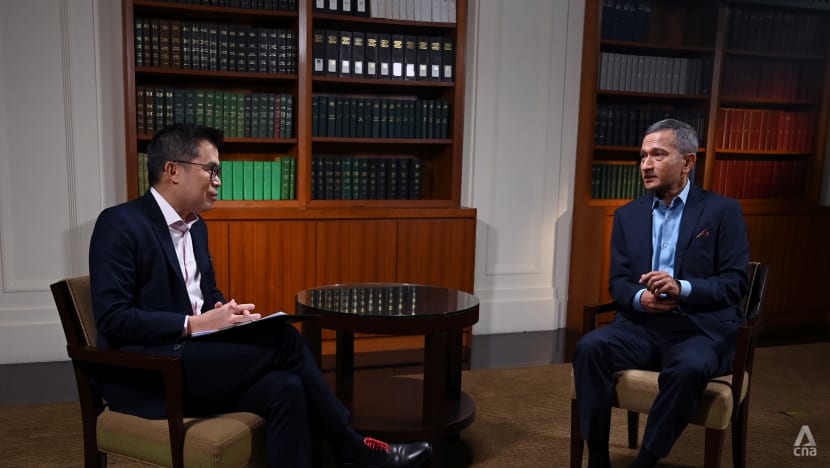New ‘golden age’ in technology if US, China can build trust, sit at same table: Vivian Balakrishnan

There can be a new “golden age” in the digital arena if the United States and China can build up trust and engage each other, said Singapore Foreign Affairs Minister Vivian Balakrishnan.
He was responding to a question on cooperation in the field of technology at a time when some people see a move towards a decoupled arena with the US and China on separate sides.
“What has changed is that as we transition to a multipolar world and as China is no longer just catching up, but has every intention and ambition of overtaking where it can, at least in certain sectors, you now have real peer competition,” said Dr Balakrishnan in an interview with CNA conducted ahead of a visit by US Vice President Kamala Harris.
Noting that even during the Cold War, the Soviet Union posed an “unequal challenge” in terms of its economy and technological advances, Dr Balakrishnan called these “unprecedented times”.
But if the two superpowers - US and China - can work out sufficient “modus vivendi rules of engagement” - norms allowing them to compete, collaborate and contest - then things may be looking up, he said.
“It's not just one race, but we are going to be sitting round the same table time after time - engaging, competing, pushing, persuading, cajoling, and you build up trust,” he said.
“Then that can be, in fact, a start of another golden age in the digital arena because the cumulative weight of investment and contest and innovation will unlock a tremendous burst of creativity, innovation and entrepreneurship. That's the golden scenario.”
He also painted an opposite scenario where trust between the US and China is eroded.
BIFURCATION AND CLIMATE CHANGE
With bipartisan suspicion of China in Washington and China’s worries that America is not taking a “benign and collegial” approach, “bifurcation” could be the other possible outcome.
“All this talk of bifurcation, of economic sanctions, of denial, of access to technology. I worry that … we will end up with a self-fulfilling cycle,” said Dr Balarkrishnan.
“Where trust is depleted, bifurcation of supply chains occurs, which in turn leads to a bifurcation of technology, which must mean a world with slower progress ... then it will pose a problem for countries like us.”
On whether there can be cooperation between the two countries on climate change, Dr Balakrishnan said that the negotiations that led to the Paris Agreement in 2015 would not have occurred without the “confluence and congruence” of the United States and China.
“I knew both the special envoys at a personal level very, very well, and I can tell you without that duet between America and China, the Paris agreement would not have occurred,” he said.
With urgent warnings from the latest Intergovernmental Panel on Climate Change (IPCC) on global warming, this is an existential threat that requires the two nations to get together, he said.
“If in the next three years, we can't get America and China in the same room, sitting at the same table and doing what needs to be done for our planet. We're all in deep, deep trouble.”
Source: www.channelnewsasia.com
